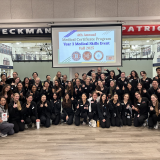Senior Psychology Student Sohini Mukherjee Discusses Presenting At The American Psychosomatic Society Held every year in March, the APS's Annual Meeting is an extremely prestigious honor.
March 23, 2016
Sohini Mukherjee is graduating in May with a double major in English and psychology, and has been studying diarrheal diseases in India since she was a sophomore at Chapman University. Less than two years after traveling to Denver, Colo., to present a research project titled Study of Socioeconomic, Sanitation and Hygiene Factors as Determinants of Recurrent Diarrhea in Children Aged Five and Under at the Western Regional Honors Conference, Mukherjee was selected to return to Colorado to present her senior research project at the prestigious American Psychosomatic Society. Held annually, the three-day meeting is devoted to presenting scientific papers, attending workshops, and engaging in discussions with some of the most important members in the world of psychology. Mukherjee presented her research, titled Maternal, Environmental, and Social Context Predicts Diarrheal Infection Incidence in Young Children in Sundarbans, India, and we asked her some questions about what that experience was like.
Q: What was the process like for being selected to present at the American Psychosomatic Society? When did you submit your research/did you submit your research at all? How many other students were selected to present?
A: I submitted my research abstract back in October and I was informed of their decision in January. I was very excited when I was selected to present at the American Psychosomatic Society, especially when I was informed that I was giving an oral presentation. I did not know it at the time, but I later found out that being chosen for a talk was very selective and it was very unusual for an undergraduate to do so.
Q: What IS the American Psychosomatic Society and why is it a big deal to present there?
A: The American Psychosomatic Society integrates and advances our understanding of biological, psychological and social factors as they relate to health. The research being presented there comes from the very best minds in the field and they come from all over the world from various institutions.
Q: Your senior project, titled Maternal, Environmental, and Social Context Predicts Diarrheal Infection Incidence in Young Children in Sundarbans, India, is very specific. What was the reason for researching this topic?
A: The topic is specific because it looks at a very disadvantaged population in India suffering from a devastating disease through a new lens. Diarrheal disease kills around 300,000 children under the age of five in India each year and is the third leading cause of death in this age group in India. The population in the Sundarbans is especially vulnerable as they lack the resources to prevent and combat the disease. Furthermore, we do not know very much about how the mother’s psychological well-being relates to this, if at all.
Personally, my whole reason for pursuing this topic is because of the difficulties I have seen women in this region experience, and I wanted to be a part of telling their story in an attempt to bring awareness and aid to the region
Q: What was the experience of presenting like?
A: Presenting was extremely nerve wracking! I was very nervous before I went on, and I practiced over and over again to make sure I knew what I was talking about. There were a lot more people in the audience than I expected; nevertheless, the presentation went very well. I got a lot of great feedback and it makes me excited to do similar presentations in the future.
Q: How many people do you think were in the audience?
A: There may have been a little over 30 people in the room I would say.
Q: How did the audience respond to your research and findings?
A: I was warmly praised for my presentation and research. The chair of the program, Dr. Lorenzo Cohen, spoke to me after the presentation and we talked about his research in India. It was extremely gratifying to know that someone so highly esteemed thought my research was worth listening to.
Q: What do you want people to take away from your research?
A: I think that my study, like many others, highlights the importance of a multidisciplinary approach to health disparities, especially when it comes to the health of children. We need to remember that our social context plays a huge role in how we and our children live. Lastly, I hope that people take an interest in this region in India and similarly impoverished communities, and that we can actively work together to bring solutions that can help individuals and families.


